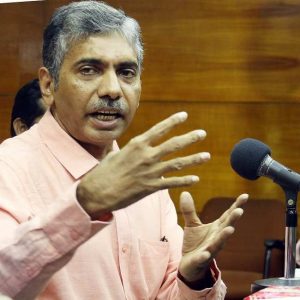The Kerala High Court has come down strongly on the government with regard to cases filed against senior bureaucrats, including KM Abraham, a former additional chief secretary
~By Jacob George in Thiruvananthapuram
On February 27, 2014, the Supreme Court issued a non-bailable warrant against Sahara group supremo Subrata Roy asking the police to arrest and present him before the Court on March 4. The Court’s decision was based on a detailed report of KM Abraham, a senior Kerala bureaucrat on deputation with Securities and Exchange Board of India (SEBI), exposing grave irregularities and money laundering in the Sahara group.
On February 27, 2017, the Vigilance and Anti-Corruption Bureau (VACB) of Kerala submitted before the High Court that there was scope for a preliminary enquiry against Abraham in connection with allegations of corruption and irregularity in the re-designation of librarians in aided colleges as UGC librarians. This was the last in a series of eight orders for quick verification against him.
Yes, there were eight quick verification processes and an FIR against Abraham, Additional Chief Secretary (ACS), Finance, to the government of Kerala. Abraham is a 1982-batch IAS officer known for his impeccable credibility and uprightness. All these cases were filed by the vigilance headed by DGP Jacob Thomas.
BUREAUCRATS HOUNDED
Incidentally, vigilance cases have been filed against other senior IAS and IPS officers too in Kerala. In a case against Tom Jose, another ACS, the vigilance has asked the government to suspend him immediately so that he cannot interfere with the inquiry. However, the chief secretary, industries secretary and law secretary objected to this. But the vigilance has raided his house and blocked his bank accounts.
The IAS fraternity got together and was about to take mass leave on January 9 but withdrew from it after meeting Chief Minister Pinarayi Vijayan. The immediate provocation was a vigilance move to charge ACS (Industries) Paul Antony in a nepotism case involving senior CPM leader EP Jayarajan.
The charge against Paul Antony stirred the IAS community. Pitted against all of them was Jacob Thomas, who, they feared, was determined to pin them down on one allegation or another. A note circulated among the IAS officers said: “We are deeply aggrieved that such an officer (the vigilance director), whose integrity is prima facie doubtful and not beyond suspicion, is allowed to sit in judgment as the vigilance director on the conduct of other civil servants.” The officers also pointed out that Thomas was allegedly involved in corruption while he was director of ports, and faced a forest land encroachment case in Karnataka.
THOMAS INDICTED
The port case was regarding an inquiry undertaken by the finance department when it was headed by Abraham. It started on October 21, 2016, with a complaint given by one Sathyan Naravoor regarding the purchase of a dredger by the Department of Ports when Thomas was the director there. Diligent and meticulous, Abraham called for all the files and documents and questioned officers connected with the purchase formalities. He even got in touch with IIT-Chennai to get the specifications of a dredger. After analysing all the data and tracking emails and scanning numerous files, Abraham made a 239-page report on 28 irregularities committed by Thomas.
The report found Thomas guilty of various offences, including criminal conspiracy, forgery and corruption. The deal caused a loss of Rs 14.96 crore to the state exchequer and a pecuniary advantage of Rs 2.67 crore to a foreign firm, IHC Merwede of Holland, the report said. The deal was awarded to IHC deliberately avoiding the lowest tender quoted by public sector firm BEML. “The Director of Ports went ahead with the tender without even assessing the actual needs of the department. The original estimate of Rs 8 crore based on specifications that were admittedly adequate to meet the requirements of the department would have got more involvement of Indian and global manufacturers,” said the report.

This was forwarded to the CM with a strong recommendation by Chief Secretary SM Vijayanand who stated that the report highlighted several irregularities which included unduly favouring a foreign company, possible forgery, cheating, deliberate misrepresentation of facts and abusing the tender process. “A police enquiry under a team of two or three senior and efficient officers, ably supported by technical experts of impeccable credentials can carry out the investigation. Since Dr Jacob Thomas is the Director of Vigilance and Anti Corruption Bureau, he may be asked to stand down till the enquiry is completed,” recommended Vijayanand. But the CM chose to send the report to the Director-General of Prosecution, C Sreedharan Nair.
Even in the case of Sahara, Abraham exposed financial irregularities in Sahara India Real Estate Corporation and the Sahara Housing Investment Corporation. “The two companies are without a doubt, clearly in gross violation of the provisions of the law applicable to public companies making offers of securities to the public. They seem to be unable to furnish even the basic data on the identity of its own investors,” said Abraham in his report of the company in 2011.
ON THE RIGHT TRACK
During the investigation, Abraham challenged the two companies to produce the list of depositors. And the officials produced truckloads of lists in large bundles. He deputed his officers to examine them. To his surprise, he saw more than two lakhs Kalavathis among the names of depositors. And none of them had an address. Abraham proved that the lists and statements of the companies were wrong.

Interestingly, Abraham was not given an extension at SEBI due to immense political pressure from Delhi. He even wrote a letter to then prime minster accusing the finance ministry of pressurising the regulator to slow down on some of high-profile cases. His tenure had an abrupt end as he could not make it to the coveted post of SEBI Chairman.
Even in the dredger case, he started work on October 21, 2016 and on October 26, a team of vigilance officers raided his house when his wife was alone. The raid was in connection with a disproportionate assets case. But two days later, the CM himself came forward in the state assembly to protect Abraham, saying that there were procedural flaws in the vigilance raid. “Abraham is an efficient officer with utmost seriousness,” he added. But there is no reprieve for Abraham with eight vigilance cases and an FIR against him.
Other senior bureaucrats who are being hounded are now looking to the High Court for succor. The Court, in fact, had recently warned the government of a “Vigilance Raj” and criticised the vigilance for exceeding its limits. “The government needs to think seriously whether the VACB should be allowed to reign over the state,” warned the Court. But the next day, the vigilance chief responded by putting up a notice which said that the vigilance will no more accept complaints on major allegations of corruption.
It remains to be seen who will win eventually.


